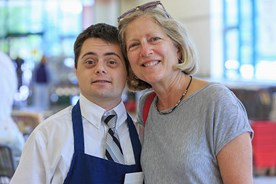- Wakefield SEND Local Offer
- Preparing for Adulthood
- Education and Employment
Education and Employment
Post 16 further education
The majority of young people with SEND leaving school after year 11, with either SEN Support or an EHC Plan, will access a local further education or sixth form college. Further education and sixth form colleges have a statutory responsibility to meet the needs of young people with SEND. There is a named person who oversees SEND provision and co-ordinates support similar to the role of the school SENCo.
Colleges must use their best endeavours to secure the special educational provision a young person needs, and to make reasonable adjustments to prevent them being placed at a substantial disadvantage. Colleges should offer an inclusive approach to learning and teaching, with high quality teaching, differentiated for individuals.

Wakefield College
Our local Wakefield College offers a wide variety of courses from pre-entry to at least level 3; academic, vocational, work preparation and independent living; all colleges support young people with SEN and many, offer personalised support around care, medical and therapy support, and further enable learners with complex and multiple learning difficulties and disabilities.
Read more about Wakefield College courses and pathways to find out what they offer.
Families are welcome to visit any of the settings on their open evenings. The providers themselves recommend this as a first step. If you have made a choice or are trying to decide between two options you can invite the providers to your Year 10 or 11 Preparing for Adulthood Annual Review.
To arrange a visit families can ring the provider directly, or speak to the Connexions Advisor or SENDIASS.
From Year 12, a full time course, as defined by the Education Funding Agency, typically ranges between 540 and 600 guided learning hours per year. This equates to approximately 16 hours per week and many college full time programmes are run over 3 or 4 days.
Sixth forms and colleges are expected to offer coherent study programmes that stretch and progress young people to enable the best possible outcomes in adult life. They should enable young people to progress to a higher level of study than their prior attainment, take rigorous substantial qualifications, study English and Maths, and participate in meaningful work experience and non-qualification activity. Young people should not be repeating learning they have already completed successfully.
Read more about Wakefield College courses and pathways to find out what they offer.
For young people not taking qualifications their study programmes should focus on high quality work experience and on non-qualification activity which prepares them well for employment, independent living, being healthy adults and participating in society. It is anticipated that most programmes will include accredited learning.

Some young people with SEN, attending either a local mainstream or special school for their secondary education, will continue into the sixth form or post-16 provision of the school, if this is available. Other young people may join these schools for year 12, place dependent. Others may leave and attend a local further education or sixth form college.
Search a list of these providers here

Work based learning opportunities are offered by a number of colleges and training providers across Wakefield. These include:
Apprenticeships:
These are paid jobs that incorporate training, leading to nationally recognised qualifications. Apprentices earn as they learn and gain practical skills in the workplace. Many lead to highly skilled careers. Apprenticeships - are a different form of training because they only last for a set time. This could be between one to four years, the young person gets paid and has holiday time whilst they learn. The employer and the training provider are each responsible for aspects of the EHC Plan outcomes. Young people with EHC Plans can retain their EHC Plan when on an apprenticeship.

Traineeships
These are designed to help young people who want to get an apprenticeship or job but don’t yet have appropriate skills or experience. They last for a maximum of six months and include core components of work preparation training, English and Maths (unless GCSE 1-4* standard has already been achieved) and a high quality work experience placement. They are currently open to young people aged 16 to 24, including those with EHC Plans. Young people with EHC plans can retain their plan when undertaking a traineeship.

Supported Internships
Supported Internships are a structured study programme aimed at young people aged 16 to 24 with a learning disability and an Education, Health and Care Plan (EHCP). The programme primarily, is based at an employer’s premises. There is no legal requirement or expectation that the supported intern will be paid
Supported Internships are a great opportunity to improve the life chances of young people with SEND to equip them with the skills and financial independence they need to achieve the four key life outcomes:
- Education, employment and training
- Having friends and being involved in the community
- Health and wellbeing
- Housing and living independently
Purpose of a Supported Internship
The purpose of a supported internship is to support young people with EHC plans to gain paid employment by:
- supporting them to develop the skills valued by employers
- enabling them to demonstrate their value in the workplace
- developing confidence in their own abilities to perform successfully at work
The supported internship can also help with:
- increasing health and well-being
- gaining friendships and a social life
- benefiting the economy, employers, families, the local community and wider society.
The degree of success of a supported internship is measured through the intern’s transition to sustained and paid employment.
Supported Internship Programme
A Supported Internship is a one-year full time (5 days per week) programme based within an organisation. Interns are supported by a tutor and job coaches. Interns spend around 75% of their time working and gaining experience in a real work setting (3 work placements a year) developing the skills that are valued by employers.
Up to 25% of an interns time is based in a training room, provided by the workplace, undertaking an employment-focused curriculum.
The young person will follow a personalised study programme which contributes to the long-term career goals of the young person and match their capabilities. This programme will include the opportunity to study for job-relevant qualifications as well as English and Maths at an appropriate level.
Job Coach Support
Job coaches are central to the study programme and should be trained in line with the national occupational standards for supported employment. The core role of the job coach is to provide tailored support to the supported intern. They will mentor and build the interns confidence including supporting them to try out new ways to do things, if they are not successful at first. They will train the young person in the specific job role identified using systematic instruction (a step-by-step method specifically designed to help young people with learning disabilities learn new tasks).
Job coaches are an important point of contact for employers, supporting them to match the skills and needs of interns, adapting roles and tasks and employing individuals with additional needs by assisting them to create and support a diverse workforce.
Accessing a Supported Internship Programme
If you are interested in a supported internship programme, speak to your School SENDCo. They will advise you and your parents to contact the tutor or co-ordinator of the programme. You will be invited to an open evening to find out more about the programme and to have a look at the facilities. If you are still interested, you will be given an application form to complete. You will then be considered for selection and an interview.
Programmes Available in Wakefield
Wakefield has 3 Supported Internship Programmes, listed below:
- Project SEARCH Pinderfields Hospital. This involves working across the hospital in Patient Portering, Abacus Nursery, Sterile Services, Facilities, Catering and Regional Spinal Injuries Unit.
- Project SEARCH West Yorkshire Integrated Care Board Wakefield is a new partnership and will focus on admin roles with areas within the NHS offering internship rotations available at Spectrum Community Health CIC, SLD Training and NHS West Yorkshire Integrated Care Board.
- The Shaw Trust Internship Programme. Placements are matched to the young person’s needs and vocational interests and rotations with local businesses including, Wakefield Hospice, The Entertainer, Young Lives, Create Café, Mc Donald’s, MENCAP, Oakfield Park and Pinderfields Primary School.
Completion of Supported Internship Programme
The team around the intern consists of Tutor/s and Job Coach/es. They play crucial roles in helping interns to secure paid employment or meaningful progression by:
- negotiating opportunities for paid employment with the employer providing internship
- where that is not possible, supporting interns with job searches and signposting to other work opportunities, including apprenticeships
- supporting job applications, including CV development and revisions
- helping interns prepare for and accompanying them to job interviews
- signposting interns to other services (for example, Access to Work or local supported employment services) and if necessary, liaising with these agencies
Contact details
If you are interested in accessing a supported internship, and would like more information, please contact the Preparing for Adulthood Team at: SEND@wakefield.gov.uk
This delivers two strands under one service – Employability and Supported Employment. The Employment Hub supports the skills and agenda of Wakefield and promotes social inclusion within communities by opening up a career pathway to sustainable and substantive employment and further and higher education for young people with SEND 16 plus.
The SEND Careers Hub has been designed to encourage schools and colleges to work in partnership, creating a sustainable network of teachers, careers leads and local employers where best practice is shared, careers support can be strengthened and work experience and training opportunities are offered. There are 29 hub members, consisting of 19 mainstream schools, 2 FE colleges, 2 PRU and 6 SEND providers, based across the Leeds City Region;
- Leeds
- Wakefield
- York
- Calderdale
The Wakefield schools / colleges within the hub are as follows:
|
Highfield School |
|
Horbury Academy |
|
St Thomas à Becket Catholic High School |
|
Wakefield College |
|
High Well School |
|
Minsthorpe Community College |
|
Outwood Academy Hemsworth |
|
The Featherstone Academy |
|
Castleford Academy |

There is a recognition that there is a need to improve positive destinations and significantly increase employer engagement opportunities of all young people with SEND across the region.
Nationally and in the Leeds City Region statistics show that young people with SEND are less likely to enter employment as a destination after school. Around 6% of people with a learning disability are in paid employment, despite more than 60% being willing and able to work. Powell, A. (2020). People with disabilities in employment
Each hub member sits within a working group with a specific focus, to improve positive destinations and increase employer engagement. The 2 working groups are currently developing projects which aim to benefit all schools / colleges within the region.
The improving positive destination working group are developing a SEND Alumni project in partnership with the University of Derby, and the increasing employer engagement working group are developing a project in partnership with Lighthouse Futures Trust. Both projects will consist of high quality training and bespoke resources for school leaders, teachers and employers. All resources will be released on our FutureGoals website, with the first set due to be released early December 2020.
More links
The SEND Code of Practice 2015, chapter 8.49 says “Local authorities should be ambitious for children and young people with SEN, raising aspirations and promoting high expectations about what they can achieve in school, college and beyond”. Local authorities should ensure and young people have access to the right support and opportunities that will prepare them successfully for adulthood by helping them achieve the agreed outcomes in their EHC Plan. This will enable many more young people with SEN to complete their formal education.

One of the most important things you need to consider, and possibly one of the biggest challenges, is getting a job. If you want to move straight into employment after education you should be looking and applying for jobs at least 3 months before leaving.
Please see the Info Page Employment to learn about finding a job.
Ambitious About Autism now has a Transition to Employmnent Toolkit. You can download this for free. It is for young people, but parents, carers and professionals also might find it useful.

The SEND Next Steps Careers event is for young people and their families. The event may also be useful for professionals working with young people.
It is happening on Tuesday 1st October 2024. It takes place 11am - 6pm at Wakefield Trinity Stadium, Doncaster Road, Wakefield WF1 5EY.
There will be stalls from the following:
- Colleges
- Training Providers
- Supported Internships
- Employers
- Support Services
